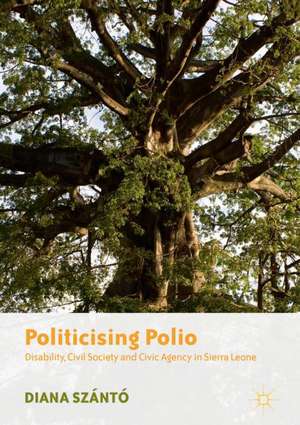Politicising Polio: Disability, Civil Society and Civic Agency in Sierra Leone
Autor Diana Szántóen Limba Engleză Hardback – 2 dec 2019
Preț: 589.02 lei
Preț vechi: 692.96 lei
-15% Nou
Puncte Express: 884
Preț estimativ în valută:
112.72€ • 116.97$ • 94.22£
112.72€ • 116.97$ • 94.22£
Carte tipărită la comandă
Livrare economică 15-29 martie
Preluare comenzi: 021 569.72.76
Specificații
ISBN-13: 9789811361104
ISBN-10: 981136110X
Pagini: 292
Ilustrații: XXV, 313 p. 6 illus.
Dimensiuni: 148 x 210 mm
Greutate: 0.56 kg
Ediția:1st ed. 2020
Editura: Springer Nature Singapore
Colecția Palgrave Macmillan
Locul publicării:Singapore, Singapore
ISBN-10: 981136110X
Pagini: 292
Ilustrații: XXV, 313 p. 6 illus.
Dimensiuni: 148 x 210 mm
Greutate: 0.56 kg
Ediția:1st ed. 2020
Editura: Springer Nature Singapore
Colecția Palgrave Macmillan
Locul publicării:Singapore, Singapore
Cuprins
Part I: Staging a play (A Critical Ethnography of Disability).- 1. The Set: Parallel Worlds (Sierra Leone on the World Stage).- 2. The Cast Onstage and Off: Polio and Beggars on Wheels.- 3. Writing the Play: Creating Disability and DPOs.- 4. Scripts about disability. Stories from the polio-houses.- Part II: After the Play? (An Ethnographic Critique of Project Society).- 5. Discrimination as Structural Violence.- 6. Perceptions, representations and coloniality.- 7. Expulsions: Disability, Power, Land, and Citizen’s Rights.- 8. Hope.
Notă biografică
Diana Szántó is a cultural anthropologist, independent researcher and activist. She worked for more than 20 years as the leader of a Hungarian-based NGO, creating opportunities, channels and incentives for intercultural understanding, learning and co-existence. Her research focuses on urban anthropology, migration and social movements, and the intersection of international development, social justice and health. In recent years she has been teaching medical anthropology and qualitative research methodology at the Health and Community program of the School for International Training.
Textul de pe ultima copertă
This book examines disability in post-war Sierra Leone. Its protagonists are polio-disabled people living in the nation’s capital of Freetown, organizing themselves as best as they can in a state without welfare. There is little concrete support for people with disabilities in a country where the government is struggling with the competing requirements of the international community, demanding - in exchange for its support - good standards of democracy and the maintenance of a free market economy. To what extent is the Human Rights framework of the disability movement effective in protecting the polio-disabled and what are the limitations of this framework? Diana Szántó’s detailed ethnography reveals, through many real-life examples, the vulnerability of disabled people living in the intersections of poverty, informality and disability activism. At the same time, it also tells about the many ways the polio-disabled community is transforming vulnerability into strength.
Caracteristici
An original contribution which develops new theoretical work in political anthropology and anthropology of disability Effectively links polio disability with post-war peace building and state reconstruction Engaging ethnographic approach guides the reader into a rich and complex universe, which remains hidden for most external observers Speaks to the broader political agendas of post-Cold War neoliberalism and conflict resolution, especially in Africa, but also well beyond Provides a retrospective analysis of factors leading to the historic turn towards the emergence of global illiberalism
